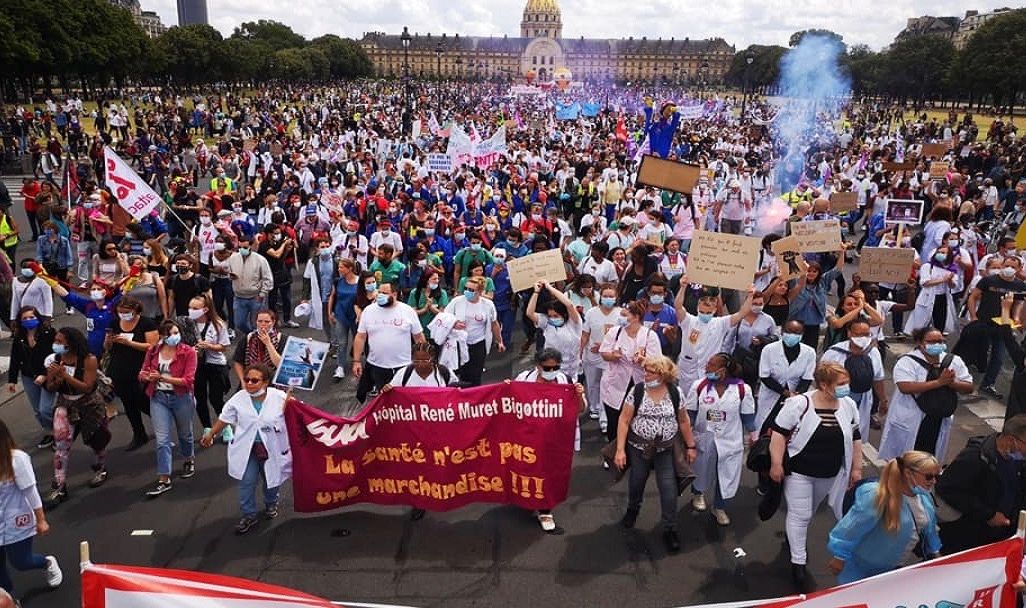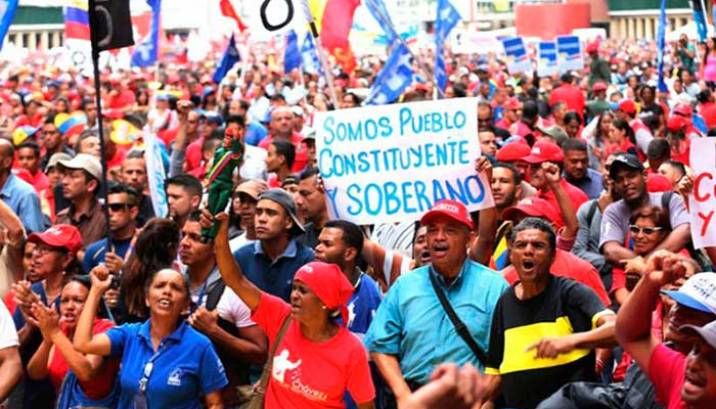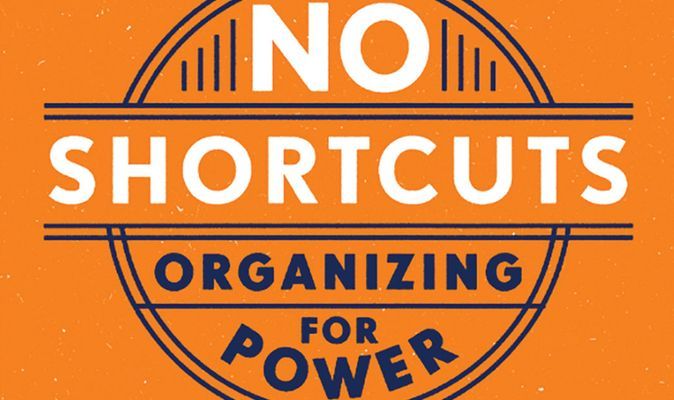Nicolas Croes is a member of Linkse Socialistiche Partij / Parti Socialiste de Lutte (ISA in Belgium).
French President Emmanuel Macron wanted to dedicate the July 14 Bastille Day national holiday to the nursing staff. But after the catastrophic management of the COVID-19 crisis, very few health care workers fell for this public relations stunt.
Their feelings were expressed by a banner unfurled in the sky with helium-filled balloons in the middle of the official ceremony in Paris. The banner read “Behind the tributes, Macron suffocates the hospitals” on one side, and “The economy is costing us our lives” on the other.
The pandemic came at a time when the health sector was already on the verge of a major crisis. Since the 2000s, the pace of budget cuts has increased considerably. By the time Macron took over the presidency of the Republic in 2017, more than 20,000 health care jobs had been cut over the preceding 15 years. The number of maternity wards in the country had been reduced by one-third over the same period. The number of hospital beds per 10,000 inhabitants in France had declined from 110 to 65 between 1981 and 2013, while the demand for health care had grown steadily in the meantime.
Trade unions and hospital collectives have been fighting for 14 months to demand more resources for the public hospitals. On the eve of the pandemic, their protests were met with police repression, batons, tear gas and arrests. So Macron’s July 14 tribute was provocative.
The president of the rich, who is also a former banker, is not stingy with provocation. At the beginning of July, he announced a cabinet reshuffle that was a real slap in the face to all women’s-emancipation activists. Three years after #Metoo, the lawyer Eric Dupond-Moretti was appointed Minister of Justice. He made himself famous through statements such as “At 30, a woman is not a vase incapable of saying no to a man who gets off on it,” and that “women regret not being whistled at anymore.” As for the new Minister of the Interior, Gérald Darmanin: he has become the “top cop of France” even though he is accused of rape, sexual harassment, and breach of trust – and the investigation is still ongoing! On November 23, 2019, demonstrations against sexism and sexual violence brought together 150,000 people, including nearly 100,000 in Paris, and were described as “the largest march in French history against gender-based violence.”
Macron: a Thatcherite President
From the outset, Macron’s presidency distinguished itself from that of his predecessors Nicolas Sarkozy (from the UMP party, which has since become Les Républicains, the traditional right) and François Hollande (from the social democratic “Socialist” Party), whose administrations were marked by severe austerity measures, but they were careful in their attacks against the trade unions. After these two presidencies, the two parties that had dominated the French political scene for 40 years were in pieces. Macron thus found himself in the place of a newcomer benefiting from a situation where other political formations were being undermined, an opportunity he seized to launch a frontal attack against the workers’ movement.
In France, the determined struggles of the workers have made it possible to repel some of the harshest neoliberal attacks and to defend certain social gains won in the past. For example, in 1995 the Juppé plan led to a struggle that pushed the government to withdraw a massive “reform” that would have undermined the pension system seen as a key gain of the working class. That year, the average annual number of strike days was six-times higher than in the period 1982–1994! If the anti-worker projects of successive governments succeeded in seriously worsening the living conditions of workers, it was at too slow a pace for the ruling class because of workers’ resistance. Macron was determined to seize the opportunity to change this.
As soon as he was elected, Macron’s government launched an offensive against laws that protected workers’ rights. A few months later, the “solidarity tax” on wealth (ISF, a wealth tax created in 1989) was abolished. And the pace of anti-working-class measures has not wavered since then, culminating in a new attempt by Macron to undermine the pension system, which triggered a mass movement on a scale and duration not seen since May ’68.
This political brutality was accompanied by extreme police brutality, as illustrated by the Gilets Jaunes (Yellow Vests) demonstrators who had their eyes gouged out and their hands ripped off by police stun grenades. For the authorities, the idea is not only to push people to stay at home, but also to divide the movement on the issue of “violence” by protesters, which is mostly a response to police violence.
Paradoxically, if Macron is prepared to push so far, it’s because he represents nothing. He doesn’t really have a base, his strength lies in the weakness of the political opposition. He was only elected in the second round of the presidential election in 2017 because he was facing the far-right candidate, Marine Le Pen, and in a context of abstention. In the recent municipal elections (whose second round took place at the end of June), Macron’s party (La République En Marche, LREM) was defeated and turnout was at an historic low: 40% (nearly 20% less than six years ago).
Macron hopes to attract a small base of voters that will be enough to get him through the first round of the next presidential elections (which he did with only 24.01% of the votes cast in 2017, against 19.58% for the left wing candidate Mélenchon who came in fourth) and to find himself again in the second round against the far-right candidate Marine Le Pen. He could then hope to benefit from the votes of those who reject the far right. It is moreover within the framework of this strategy that he appointed Jean Castex as the new Prime Minister, a “technocrat” who will not overshadow him in the run-up to the presidential elections. However, the gamble is very risky.
France Insoumise
The potential of a struggle uniting the various social movements against Macron and the world of money he represents is very clear. Already during the 2017 elections, the left-wing campaign of France Insoumise (FI, literally meaning “France Unbowed”) led by Jean-Luc Mélenchon – whose program focused on ecological planning – provoked a debate on the kind of response needed against austerity and the destruction of our environment.
This program was clearly a step in the right direction to re-politicize workers and youth after years of disgust, disillusionment, and despair. It was centered on a plan of state investment, to respond to social and ecological emergencies, and to be financed notably by a “fiscal revolution.” Unfortunately, this did not go as far as advocating to bring the banks into public ownership under democratic control and management to prevent capital flight.
Alongside its radical program, another strength of FI was its militant dynamic. In February 2016, they launched base committees and ended up organizing nearly 300,000 activists, who then participated in the development of the program through a large convention in October of the same year. Then on March 18, 2017, 130,000 people responded to FI’s call to meet in Paris to commemorate the beginnings of the Paris Commune (1871), the “first attempt at a social republic.”
France Insoumise invited its supporters to be active themselves, to hold political tables on the streets and in the markets (or even just to sit on their doorstep with coffee, a radio, and a literature table), and to address colleagues and friends, etc. This approach of transforming passive support into active involvement is a crucial element. In the end, Mélenchon failed by only a hair’s breadth to make it to the second round of the presidential elections to take on Macron.
Once Macron was elected, FI correctly took initiatives to support labor struggles against Macron’s attacks and to try to help overcome the indecision of union leaders. Unfortunately, the main union leadership, with qualifications, blocked any attempt to move towards a national struggle culminating in a general strike. FI continued its initiatives, but with more emphasis on their parliamentary initiatives. These efforts engaged a huge number of activists when they were sorely needed in building social struggle. Even during the demonstrations, there was less and less of a clear FI contingent, although its activists and supporters were present and often on the front lines.
With the end of street initiatives, and also faced with a structuring of the movement that did not allow for the best involvement of the base, many FI supporters were left wondering what they had to do beyond applauding the work of elected officials. In addition to this, there was an intense media campaign against FI as well as a scandalous politically motivated investigation that saw 150 police officers raid both FI headquarters and at the home of Mélenchon solely on the basis of a denunciation made by an extreme right-wing activist.
When a party no longer builds on its strengths or when this is no longer possible, weaknesses tend to become more apparent. It has not been different in the case of FI with regard to its lack of internal democracy, its lack of a clear appeal to the working class (preferring to talk about the “people” in a vague way), and its approach that refuses to openly attack capitalism. Gradually, the idea that it was an anti-system political formation faded, without disappearing completely.
The possibility of laying the groundwork for the construction of a new mass party of workers and youth was thus postponed. But the potential around FI is far from dead. For example, during the lockdown, FI called for massively expanding the health care workforce, increasing their wages, and to bring certain sectors into public ownership in a plan to face the pandemic emergency.
Gilets Jaunes and the Pension Struggle
When the working class finds itself in a deadlock at the union level, it looks for other avenues. This may involve elections, but also fighting back on a whole range of political issues related to oppression, discrimination, corruption, poverty, health, or inequality. Social movements are generally inventive, rarely following preconceived paths. It is within this framework that we must see the birth of the extraordinary, spontaneous Gilets Jaunes movement in the fall of 2018.
This movement was triggered directly by the increase in fuel taxes, but it quickly became a general revolt against: the cost of living, low wages, low pensions and allowances; the suppression of public services; the privileges of the richest and elected officials; the manipulation of information by the established media; police violence; and the arrogance of elites and democratic failures. This movement was a great surprise in terms of its duration, determination and ability to mobilize. It was strongest where a convergence could be found with the workers’ movement, despite the reluctance of some union leaders. If the movement has weakened over time, it is because of extreme police repression and because of the lack of connection with the labor movement and its methods, first and foremost the use of strike action and the blocking of economic activity.
But the anger remained very present and was expressed with the pension-defense movement that developed at the end of 2019. More than six weeks after the start of the movement, 60% of the population still supported it. On the first day of strikes and demonstrations against Macron’s pension “reform” project, on December 5, no less than 1.5 million people took part in the nearly 250 marches throughout the country. By way of comparison, the first day of strikes and demonstrations against anti-labor legislation in 2016 was attended by 500,000 people, according to estimates by the same unions. Unfortunately the movement lacked structure at the base to build a genuine general strike under democratic control instead of only single-day actions decided from the top. The pandemic and the lockdown put a temporary end to this fight.
The Mass Revolt is Still Smouldering
Until a few months ago, references to the May 1968 general strike were not lacking in the press. At the height of this real month of revolution, the combination of the youth in struggle and a general strike of 10 million workers nearly overthrew the system. Social anger in the past period has reached a boiling point similar to fifty years ago. This was further illustrated by the solidarity mobilizations with the Black Lives Matter movement in Paris. Tens of thousands of people defied the ban on demonstrations to protest against racism and police violence, crystallized around the death of Amada Traoré, a Malian-French man killed in police custody.
Most recent social movements have raised the question of activists’ control over their own struggle and the creation of democratic committees to organize the struggle. Ensuring the development of these assemblies of workers and young people in struggle is a crucial task for the struggles to come, not only for us to concretely and democratically organize the movement so that it is not betrayed by the trade union leaders, but also to develop the program of demands that is necessary to respond to the economic, social, health, and ecological crises. This program could be based on the following points:
- The immediate lowering and freezing of gas and energy prices.
- Income for living, not for surviving: increases in wages and social benefits, linked to price increases, including fuel.
- Job security with real open-ended employment contracts.
- Unemployment should be attacked, not the unemployed: collective reduction of working hours without loss of pay and to rehire laid off workers.
- Putting social needs at the center of policy: free and non-polluting public transit, public services (especially local services such as daycare, schools, maternity wards, post offices, public social housing, etc.).
- The (re)introduction of the wealth tax, the fight against tax evasion by the ultra-rich and multinationals, including through requisitioning of companies under democratic control, the end of regressive taxes (VAT, etc.) replaced by a strong taxation of the rich and large companies.
- A large environmental public service to create hundreds of thousands of jobs necessary for energy and ecological transition to a sustainable economy.
Achieving such a program requires truly socialist measures such as bringing the entire financial sector into public ownership, and creating a national investment and financing service under democratic community control. Other key sectors of the economy also need to be brought into public ownership so that big business cannot continue to sabotage the ecological transition and so that democratic planning based on needs, including ecological needs, becomes possible.
One of today’s most fundamental tasks is the creation of a genuine workers’ party that brings together the different strands of social resistance to fight for the establishment of a workers government.
We Need a New July 14!
If someone had been able to save the equivalent of €8,000 a day since the storming of the Bastille on July 14, 1789, it would today only amount to 1% of Bernard Arnault’s fortune, the richest person in France. No equality is possible in a system that is based to such an enormous degree on inequality. Capitalism must be thrown into the dustbin of history to make way for the real emancipation of all. This task is not easy, but we are not starting from nothing: we benefit from the experience, sacrifices, victories, and defeats of more than 150 years of struggle of the oppressed.
Coming together to study these lessons and how to put them into practice is a crucial priority to ensure that mass anger and the profound desire for change is not squandered. Join us and strengthen the struggle for a socialist alternative to capitalist disaster!



